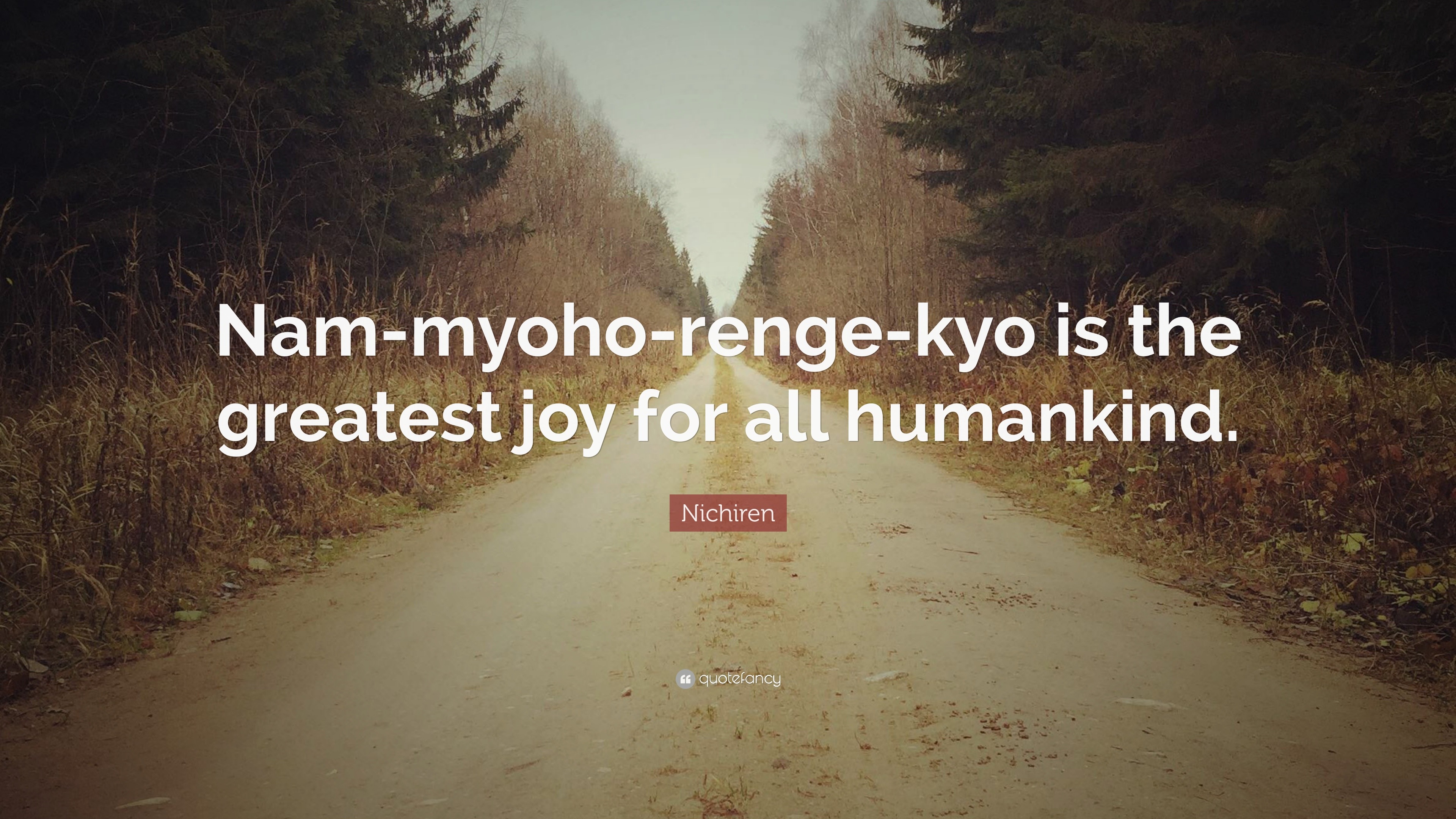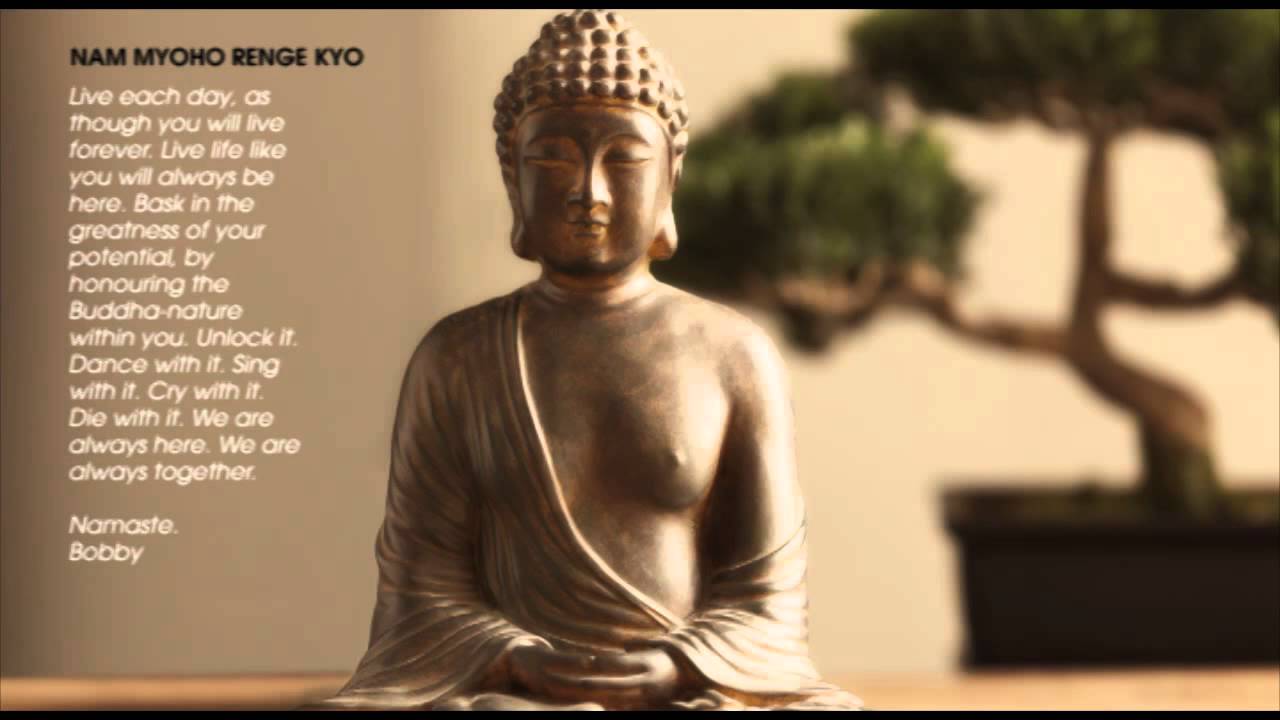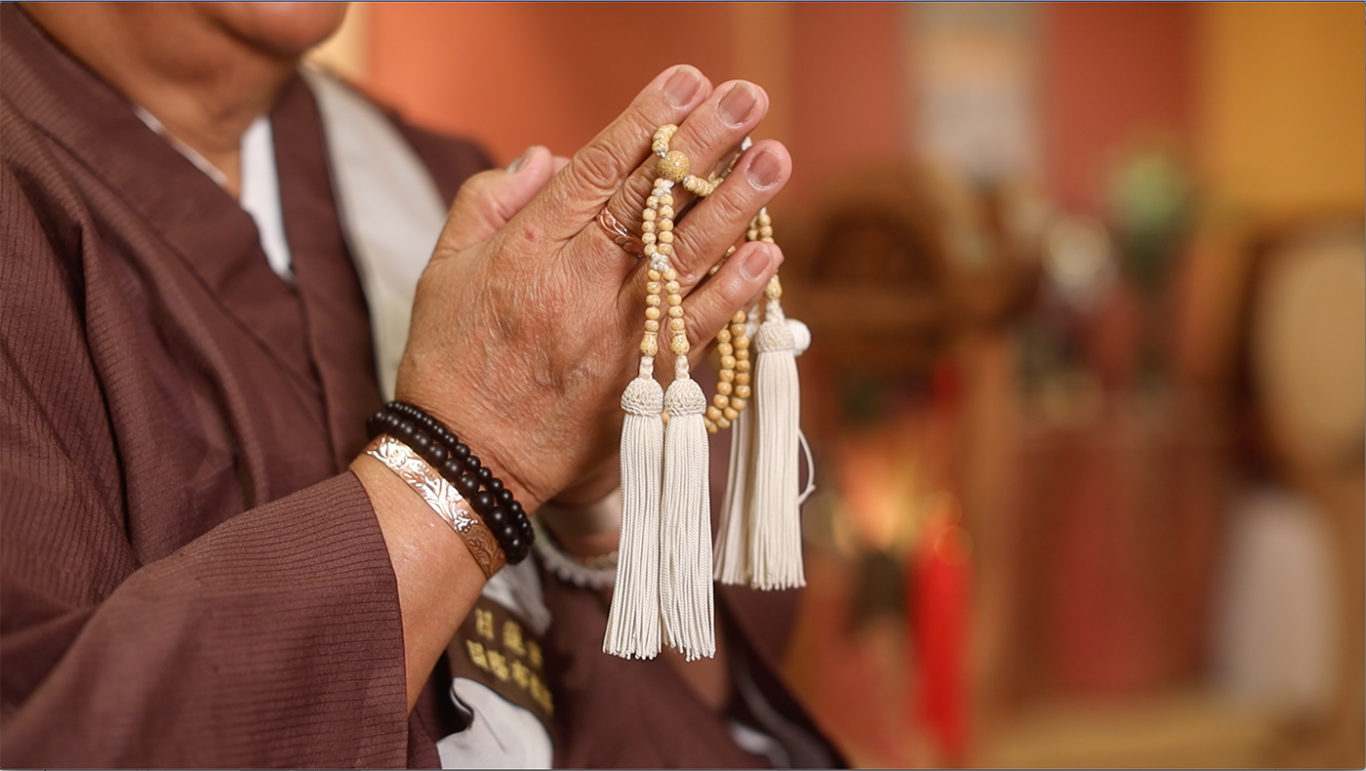
Morning Gongyo v2 Namu Myoho Renge Kyo Daimoku Traditional Buddha
Nam-myoho-renge-kyo expresses the mystic principles and functions at work within our lives—it is an expression of the Mystic Law, which corresponds to the Buddha's intent to guide all people to enlightenment.. The Daishonin has taught us that through gongyo and chanting daimoku [Nam-myoho-renge-kyo], we can reach an elevated state in.

Nichiren Quote “Nammyohorengekyo is the greatest joy for all
Daimoku Nam Myo Ho Renge Kyo (Evening Gongyo) - YouTube 0:00 / 13:56 Daimoku Nam Myo Ho Renge Kyo (Evening Gongyo) dtaamaaeo 3.58K subscribers Subscribe 4.9K Share 1.4M views 11 years ago.

daimoku Liberal Dictionary
Nam-Myoho-Renge-Kyo is the seed of Buddhahood, the life of the True Buddha, and the Law to which He is enlightened. The more you chant Nam-Myoho-Renge-Kyo, the more benefit you will receive in your life. The supporting practice is to do morning and evening Gongyo. Gongyo is the recitation of part of the second and all of the sixteenth chapter.

Letters to a Nichiren Buddhist Chanting Nam myoho renge kyo? Download
11 Answers Sorted by: Reset to default This answer is useful 5 This answer is not useful Save this answer. Show activity on this post. The simple explanation is that you are practicing mindful concentration. The latter threefold division of concentration required in the Noble Eightfold Path.

17 Best images about NMRK on Pinterest Buddhism, Buddhists and Buddha
Nam comes from the Sanskrit namas, meaning to devote or dedicate oneself. Nam-myoho-renge-kyo is thus a vow, an expression of determination, to embrace and manifest our Buddha nature. It is a pledge to oneself to never yield to difficulties and to win over one's suffering. At the same time, it is a vow to help others reveal this law in their.

Nam Myoho Renge Kyo Chant For Happiness The Mystical Significance of
The Daishonin, of course, always read both chapters. It is important to keep in mind that this practice is to show the meaning and benefit of Daimoku - Nam-Myoho-Renge-Kyo. Gongyo is called the supporting practice (Jo gyo), while chanting the Daimoku is called the primary practice (Sho gyo) The Correct Attitude Towards Gongyo

Morning Gongyo Daimoku Nam myoho renge kyo 15 minutes YouTube
An extra big thank you to my patrons who help support all three of my channels. I have Patreon.com for those wishing to contribute monthly, and also BuyMeACo.

Daimoku Nam Myo Ho Renge Kyo (Evening Gongyo) YouTube
Watch on Defining Gongyo SGI members perform a morning and evening practice known as gongyo, which consists of chanting Nam-myoho-renge-kyo and reciting portions of the Lotus Sutra. The Japanese word gongyo literally means "assiduous practice."

Pin on Interesting
Text of the Nichiren Chanting. THE 2ND CHAPTER. (HOBEN) PROSE FORM Myoho renge kyo — The wonderful Law of the Lotus Sutra Ho ben pon dai ni: Skillful Ways Ni Ji Se Son — There the World Honored One Ju San Mai — Quietly came up An Jo Ni Ki — From his samadhi Go Shari Hotsu — And said to Shariputra: Sho Bu' Chi E — The wisdom of the Buddhas

Nam myoho renge kyo Fast chanting Gongyo and Daimoku YouTube
At the heart of Evening Gongyo is the chanting of Nam-myoho-renge-kyo, which Nichiren Daishonin identified as the essence of the Lotus Sutra. This mantra encapsulates the core principle of Nichiren Buddhism: the inherent Buddha nature in every individual and the possibility of attaining enlightenment in one's current form and lifetime.
Nam Myoho Renge Kyo Gohonzon Android Apps on Google Play
The most important aspect of the Buddhist prayer Nam-Myoho-Renge-Kyo is the Gongyo (the sound of the koans). This chant is said to be a combination of the words "nammyo" and "renge" and is said to be the first part of the Nichiren Shoshu prayer. It is a vital part of the practice of meditation.

Nam Myoho Renge Kyo Chant For Happiness How to Have a More Power
The basic Buddhist practice of Soka Gakkai members is chanting Nam-myoho-renge-kyo, reciting portions of the Lotus Sutra (referred to as gongyo) and sharing the teachings of Buddhism with others in order to help them overcome their problems. Soka Gakkai members in Peru at Machu Picchu [© Seikyo Shimbun]

What is the daimoku (namumyohorengekyo)? Buddhism for Beginners
Nam Myōhō Renge Kyō is a mantra that is chanted as the central practice of all forms of Nichiren Daishonin Buddhism. Myōhō Renge Kyō being the Japanese title of the Lotus Sūtra. The mantra is.

nammyohorengekyo gongyo & daimkuo daily challenge day 6 YouTube
Nam-myoho-renge-kyo is a wondrous expression of the Buddhist principle that we all possess infinite courage, wisdom and compassion. That's why chanting Nam-myoho-renge-kyo is a daily practice for opening our eyes to our Buddhability within, each day.. Do Gongyo. Buddhists who practice with the SGI chant Nam-myoho-renge-kyo and recite two.

Nam Myoho Renge Kyo Chant For Happiness The Significance of Doing
Daimoku Nam Myoho Renge Kyo- Morning Gongyo Nam Myōhō Renge Kyō (南無妙法蓮華經, also Namu Myōhō Renge Kyō; To Honour/devote.more.more Daimoku Nam Myoho Renge Kyo- Morning GongyoNam.

Pin on Nam Myoho Renge Kyo
"Reciting gongyo and chanting Nam-myoho-renge-kyo each day is a ceremony in which the microcosm of our lives harmonizes with the macrocosm of the universe. By engaging in this ceremony morning and evening, we bring forth the power to direct our lives toward the greatest happiness" ( My Dear Friends in America, third edition, p. 48).